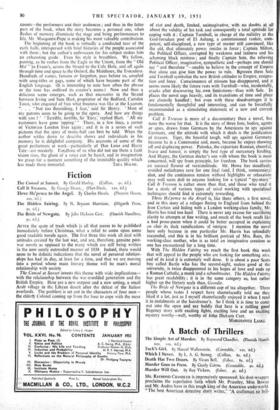Fiction
Three Ha'pcncc to the Angel. By Charles Harris. (Phoenix House.
ios. 6d.)
AFTER the spate of trash which is all that seems to be published immediately before Christmas, what a relief to come Upon some good readable novels again. The first three this week all deal with attitudes created by the last war, and arc, therefore, genuine post- war novels as opposed to the many which are still being written in the now surely outmoded manner of 1939. Indeed, there would seem to be definite indications that the novel of personal relation- ships has had its day, at least for a time, and that we are moving into a period whose main literary theme will be man's moral relationship with society The Consul at Sunset invests this theme with wide implications— with the relationship between the war-moulded generation and the British Empire. Here are a new outpost and a new setting, a small Arab village in the Libyan desert after the defeat of the Italian overlords. The problem is set out in the characters of four men- the eldert Colonel coming up from the base to cope with the mess of riot and death, limited, unimaginative, with no doubts at all about the validity of his task and consequently a total aptitude for
coping with it ; Captain Turnbull, in charge of the military at the God-forsaken post of El Ashang, a commissioned ranker, com- petent, self-disciplined, a new type of master still convinced, like the old, that ultimately power resides in force ; Captain Milton, the Political Officer, corrupted by weakness and laziness and his scheming black mistress ; and finally Captain Sole, the relieving Political Officer, imaginative, sympathetic and—perhaps one should say " and therefore "—unable to believe in the concept of Empire that alone can give him the power to rule. Between them Sole and Turnbull symbolise the new British attitudes to Empire, resigna- tion and force. Consciousness of mission has disappeared, and it seems more likely the future rests with Turnbull—who, incidentally, cracks after discovering his.own limitations—than with Sole. In places the novel sags heavily, and its transitions of time and place arc clumsily handled ; but even with these disadvantages it is fundamentally thoughtful and interesting, and can be forcefully recommended as a stitnulating statement of a new and current problem.
Call It Treason is more of a documentary than a novel, but none the worse for that. It is the story of three Joes, bodies, agents or spies, drawn from Germans by the Americans to spy against Germany, and the attitude with which it deals is the justification of treason. Tiger, the boastful tough, will spy against Germany because he is a Communist and, more, because he enjoys showing off and displaying power. Palooka, the expatriate Russian, 'cheerful, brave and honest, is simply the best type of mercenary hireling. And Happy, the German doctor's son with whom the book is most concerned, will spy from principle, for freedom. The book carries an unusual flavour of verisimilitude. Mr. Howe has steadfastly avoided melodrama save for one final (and, I think, unnecessary) shot, and the continuous tension without highlights or relaxation may well seem duU to anyone looking for a typical "spy-story." Call It Treason is rather more than that, and those who read.'it for a study of various types of mind working with specialised techniques should find it extremely rewarding. Three Ha pence to the Angel is, like these others, a first novel, and in this story of a refugee fleeing to England from behind the Iron Curtain and hiding with a London working-class family, Mr. Harris has tried too hard. There is never any excuse for sacrificing clarity to attempts at fine writing, and much of the book reads like a bad prose-poem when it could be better occupied in explaining en clair its dark ramifications of intrigue. I mention the novel here only because in one particular Mr. Harris has splendidly succeeded, and this is in his brilliant portrait of Mrs. Rees, the working-class mother, who is as total an imaginative creation as one has encountered for a long time.
With The Hidden Fairing we reach the first book this week that will appeal to the people who are looking for something nice, and of its kind it is extremely well done. It is about a pool–Scots boy called Bartle who has the second-sight; makes good at the university, is twice disappointed in' his hopes of love and ends up a Roman Catholic, a monk and a schoolmaster. The Hidden Fairing has great readability ; it is in The same category as, but rather higher up the literary scale than, Geordie. The Bride of Newgate is a different cup of tea altogether. Three people whose tastes I respect have shamefacedly told me they liked it a lot, just as I myself shamefacedly enjoyed it when I read it in instalments at the hairdresser's. So I think it is time to come out into the open and say boldly that here is a rattling good Regency story with exciting fights, exciting love and an exciting mystery worthy—well, worthy of John Dickson Carr.
MARGHANITA LASKI.


































 Previous page
Previous page